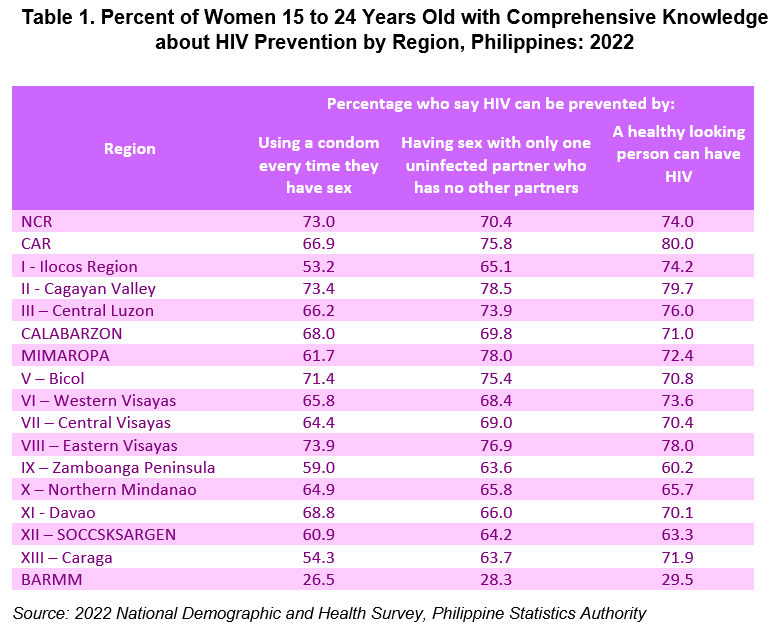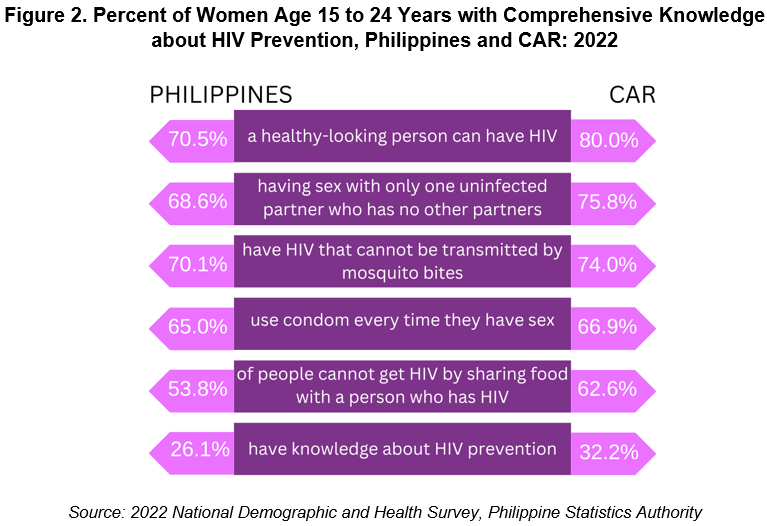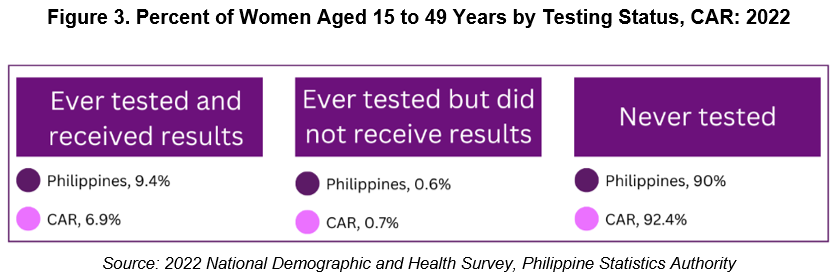Data on health indicators presented in this special release were obtained from the results of the Key Indicators Report of the 2022 National Demographic and Health Survey (NDHS). The 2022 NDHS is the seventh Demographic and Health Survey (DHS) conducted in the Philippines in collaboration with the worldwide DHS program, and the 12th in a series of national DHS conducted every five years since 1968.
The 2022 NDHS provides information on the basic demographic and health indicators, specifically on fertility, fertility preferences, family planning practice, childhood mortality, maternal and child health, nutrition, knowledge, and attitudes, regarding HIV/AIDS, violence against women, child discipline, early childhood development, and other health issues. These indicators are crucial in policymaking, program planning, and monitoring and evaluation of population and health programs, including those related to the Sustainable Development Goals (SDGs).
93% of Cordilleran women are aware of HIV /AIDS
In 2022, 92.8 percent of Filipino women 15 to 49 years of age have heard of human immunodeficiency virus (HIV) or acquired immunodeficiency syndrome (AIDS).
Among regions, women in NCR ranked the highest on HIV awareness with 94.2 percent, followed by women in CAR and Ilocos Region, both with 93.2 percent.
Almost all regions of the country have high proportion of women with knowledge on HIV (more than 90.0 percent) with the exception of women in BARMM (58.8 percent).
3 in 10 Filipino women have knowledge of medicines to treat or prevent HIV
Only 27.5 percent of Filipino women have heard of Antiretroviral medicines or ARVs that can be used to treat HIV. ARVs are taken by people living with HIV to keep them healthy by preventing the virus from progressing to AIDS. By taking ARVs, individuals living with HIV also greatly reduce the risk of passing the virus on to others. Women living with HIV who take ARVs during pregnancy and breastfeeding reduce the chances of passing the virus on to their children.
In addition, almost half (48.6 percent) of the women aged 15 to 49 years know that the risk of mother-to-child transmission (MTCT) of HIV can be reduced by the mother taking special drugs.
32% of Cordilleran women have knowledge of HIV prevention
About 65.0 percent of Filipino women are aware that using condoms consistently during sexual intercourse is an effective way of avoiding the spread of HIV. Nearly seven in ten women (68.6 percent) realize that restricting sexual intercourse with one uninfected partner reduces the risk of obtaining HIV significantly.
In CAR, 93.2 percent of women age 15 to 49 years have heard of HIV or AIDS in 2022. About 66.9 percent are aware that using condoms regularly can help prevent the spread of HIV.
Among regions, Cordilleran women ranked third (32.2 percent) with the highest percentage of women who have knowledge of HIV prevention (Figure 1). Furthermore, 75.8 percent know that restricting sexual intercourse to one uninfected partner can lower the chance of developing HIV.

32% of young Cordilleran women have comprehensive understanding of HIV prevention
Among women aged 15 to 24 years, 26.1 percent demonstrated a comprehensive understanding of HIV prevention. This shows that only one in four women within this age group possess in-depth knowledge of preventing HIV.
Among regions, young women in the National Capital Region exhibited the highest proportion of women knowledgeable about preventing HIV with 45.0 percent, followed by Eastern Visayas and Cordillera Administrative Region, with 32.3 percent and 32.2 percent, respectively.
Meanwhile, there were four regions that did not reach at least 20.0 percent of women with comprehensive knowledge of HIV prevention. These were: Western Visayas (17.0 percent), Zamboanga Peninsula (14.3 percent), Ilocos Region (14.2 percent), and BARMM which had the lowest percentage (12.0 percent).

7 in 10 young Cordilleran women have comprehensive knowledge of HIV prevention
Only 26.1 percent of young Filipino women have knowledge about HIV prevention. This is lower compared to CAR with 32.2 percent, indicating a significant gap in understanding preventive measures and the need for intensified efforts to improve overall awareness and knowledge about HIV prevention strategies.
Meanwhile, 70.5 percent of young Filipino women 15 to 24 years of age believe that a healthy-looking person can have HIV. In CAR, 80.0 percent of young women share this belief, surpassing the national rate by nearly 10.0 percent, and contending the misconception that HIV can be identified based on appearance alone.
About 75.8 percent of young Cordilleran women believe that having sex with only one uninfected partner who has no other partners can prevent HIV transmission. This indicates a considerable understanding of the role of monogamy in reducing the risk of contracting HIV.
Moreover, 74.0 percent are aware that HIV cannot be transmitted by mosquito bites, demonstrating a good level of knowledge regarding the modes of HIV transmission.
Further, about 66.9 percent reported using a condom every time they have sex, indicating a positive trend in practicing safe sex knowledge using methods to reduce the risk of HIV transmission.
On the other hand, six in ten (62.6 percent) young women in CAR believe that they cannot get HIV by sharing food with a person who has HIV.


92% of Cordilleran women were never tested for HIV
In 2022, about 9.4 percent of Filipino women age 15 to 49 years got tested for HIV and were informed about their test outcome. However, 0.6 percent did not receive their test results. Meanwhile, nine in ten (90.0 percent) Filipino women reported not having tested for HIV.
In CAR, 92.4 percent never had undergone HIV testing. Meanwhile, of those who had undergone HIV testing, 6.9 percent of women received the outcomes of their last HIV test, while 0.7 percent did not get their results.
(SGD)
ALDRIN FEDERICO R. BAHIT, JR.
(Chief Statistical Specialist)
Officer-in-Charge
_____________________________________
TECHNICAL NOTES
Knowledge about HIV prevention is knowing that consistent use of condoms during sexual intercourse and having just one uninfected faithful partner can reduce the chances of getting HIV, knowing that a healthy-looking person can have HIV, and rejecting two major misconceptions about HIV transmission: HIV can be transmitted by mosquito bites and a person can become infected by sharing food with a person who has HIV.

